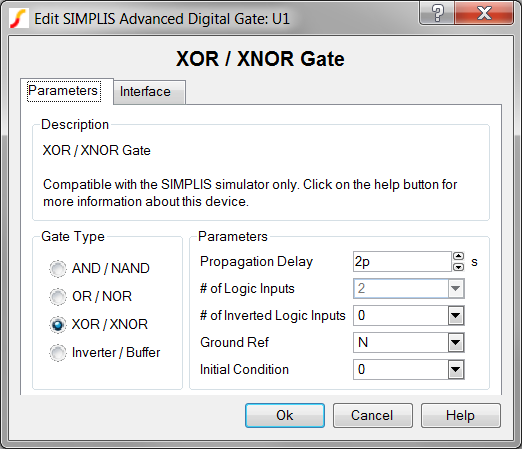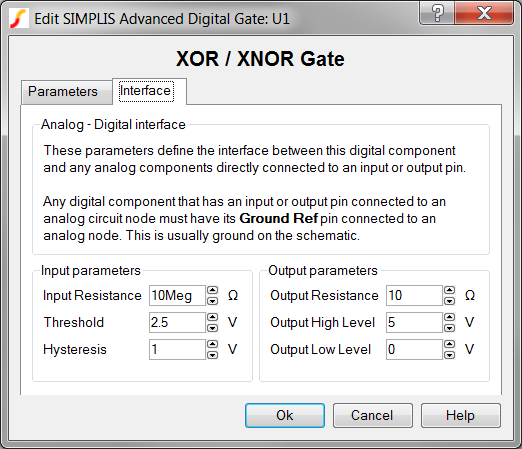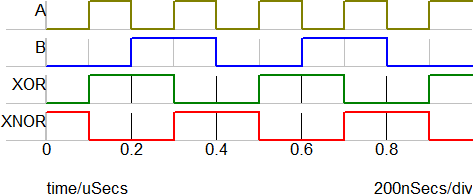SIMPLIS Parts
|
The Exclusive OR/Exclusive NOR Gate models both a generic exclusive OR and exclusive NOR gate. The number of active-low inputs can be set to either 0 or 1. Both exclusive-OR and exclusive-NOR outputs are provided. The outputs change state at the same time, making the outputs perfectly complementary.
In this Topic Hide
Model Name: |
Exclusive OR/Exclusive NOR Gate |
|
Simulator: |
|
This device is compatible with the SIMPLIS simulator. |
Parts Selector |
Digital Functions | Gates |
|
Symbol Library: |
None - the symbol is automatically generated when placed or edited. |
|
Model File: |
SIMPLIS_DIGI1.lb |
|
Subcircuit Name: |
|
|
Symbol: |
|
|
Multiple Selections: |
Multiple exclusive-OR gates can be selected and edited at the same time. |
|
To configure the exclusive OR/exclusive NOR gate, follow these steps:

| Label | Parameter Description |
Delay |
Delay from when any input pin changes state until the outputs change state |
# of Inverted Logic Inputs |
Number of active-low logic inputs. Any device can have active-low inputs up to the # of Logic Inputs minus 1. |
Ground Ref |
Determines whether or not a device has a ground reference pin. |
Initial Condition |
Initial condition of the XOR output at t=0 |
To define the parameters for the interface between this digital component and each analog component connected directly to an input or output pin, follow these steps from the Edit Exclusive OR/Exclusive NOR Gate dialog box:

| Label | Parameter Description | |||||||
Input Resistance |
Input resistance of each input pin |
|||||||
Threshold Hysteresis |
|
The Threshold (T) and Hysteresis (H) of the Schmitt trigger input buffer on each XOR / XNOR Gate input. To determine the low-to-high threshold (TH) and the high-to-low threshold (TL), substitute Threshold (T) and Hysteresis (H) in each of the following formulas :
|
||||||
Output Resistance |
||||||||
Output High Voltage |
||||||||
Output Low Voltage |
||||||||
The following truth table is for a two-input Exclusive-OR gate with active-high inputs.
Inputs |
Outputs |
||
A |
B |
Exclusive-OR |
Exclusive-NOR |
0 |
0 |
0 |
1 |
0 |
1 |
1 |
0 |
1 |
0 |
1 |
0 |
1 |
1 |
0 |
1 |
The test circuit used to generate the waveform examples in the next section can be downloaded here: simplis_058_exclusiveorgate_example.sxsch.
The waveforms below were taken from an exclusive-OR gate with both inputs selected to be active high. With this configuration, the exclusive-OR output will be high when one, but not both, of the A and B inputs are high.

The subcircuit parameters, parameter names, data types, ranges, units, and descriptions are in the following table. The parameter names
can be used to directly generate netlist entries for the device. For example, the netlist entry for
an exclusive-OR gate with active-high inputs and without ground reference would be as follows:
X$U1 5 8 2 3 SIMPLIS_DIGI1_XOR_N vars: NumInv=0 IC=0 RIN=10Meg ROUT=10 HYSTWD=1 VOL=0 VOH=5 DELAY=2p TH=2.5
| Parameter Name | Label | Data Type | Range | Units | Parameter Description | ||||||
NumInv |
# of Inverted Logic Inputs |
0 to 1 |
Number of active-low logic inputs. Any device can have active-low inputs up to the # of Logic Inputs minus 1. |
||||||||
DELAY |
Delay |
1f to 1024 |
s |
Delay from when any input pin changes state until the outputs change state |
|||||||
HYSTWD |
Hysteresis |
V |
The Threshold (T) and Hysteresis (H) of the Schmitt trigger input buffer on each XOR / XNOR Gate input. To determine the low-to-high threshold (TH) and the high-to-low threshold (TL), substitute Threshold (T) and Hysteresis (H) in each of the following formulas :
|
||||||||
IC |
Initial Condition |
LIST |
0, |
Initial condition of the XOR output at t=0 |
|||||||
RIN |
Input Resistance |
min: 100 |
Ω |
Input resistance of each input pin |
|||||||
VOH |
Output High Voltage |
V |
|||||||||
VOL |
Output Low Voltage |
V |
|||||||||
ROUT |
Output Resistance |
min: 1m |
Ω |
||||||||
TH |
Threshold |
V |
The Threshold (T) and Hysteresis (H) of the Schmitt trigger input buffer on each XOR / XNOR Gate input. To determine the low-to-high threshold (TH) and the high-to-low threshold (TL), substitute Threshold (T) and Hysteresis (H) in each of the following formulas :
|